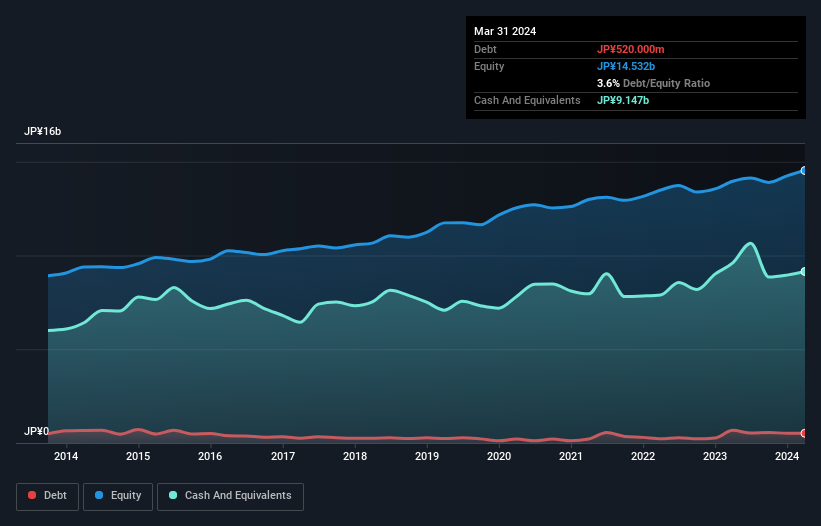Does Computer Institute of Japan (TSE:4826) Have A Healthy Balance Sheet?
Howard Marks put it nicely when he said that, rather than worrying about share price volatility, 'The possibility of permanent loss is the risk I worry about... and every practical investor I know worries about.' When we think about how risky a company is, we always like to look at its use of debt, since debt overload can lead to ruin. We note that Computer Institute of Japan, Ltd. (TSE:4826) does have debt on its balance sheet. But should shareholders be worried about its use of debt?
Why Does Debt Bring Risk?
Debt is a tool to help businesses grow, but if a business is incapable of paying off its lenders, then it exists at their mercy. Ultimately, if the company can't fulfill its legal obligations to repay debt, shareholders could walk away with nothing. While that is not too common, we often do see indebted companies permanently diluting shareholders because lenders force them to raise capital at a distressed price. By replacing dilution, though, debt can be an extremely good tool for businesses that need capital to invest in growth at high rates of return. The first thing to do when considering how much debt a business uses is to look at its cash and debt together.
Check out our latest analysis for Computer Institute of Japan
What Is Computer Institute of Japan's Debt?
The image below, which you can click on for greater detail, shows that Computer Institute of Japan had debt of JP¥520.0m at the end of March 2024, a reduction from JP¥675.0m over a year. However, its balance sheet shows it holds JP¥9.15b in cash, so it actually has JP¥8.63b net cash.

How Healthy Is Computer Institute of Japan's Balance Sheet?
We can see from the most recent balance sheet that Computer Institute of Japan had liabilities of JP¥3.72b falling due within a year, and liabilities of JP¥70.0m due beyond that. On the other hand, it had cash of JP¥9.15b and JP¥4.04b worth of receivables due within a year. So it actually has JP¥9.40b more liquid assets than total liabilities.
This surplus strongly suggests that Computer Institute of Japan has a rock-solid balance sheet (and the debt is of no concern whatsoever). Having regard to this fact, we think its balance sheet is as strong as an ox. Simply put, the fact that Computer Institute of Japan has more cash than debt is arguably a good indication that it can manage its debt safely.
But the other side of the story is that Computer Institute of Japan saw its EBIT decline by 2.6% over the last year. That sort of decline, if sustained, will obviously make debt harder to handle. There's no doubt that we learn most about debt from the balance sheet. But it is Computer Institute of Japan's earnings that will influence how the balance sheet holds up in the future. So when considering debt, it's definitely worth looking at the earnings trend. Click here for an interactive snapshot.
Finally, while the tax-man may adore accounting profits, lenders only accept cold hard cash. While Computer Institute of Japan has net cash on its balance sheet, it's still worth taking a look at its ability to convert earnings before interest and tax (EBIT) to free cash flow, to help us understand how quickly it is building (or eroding) that cash balance. During the last three years, Computer Institute of Japan produced sturdy free cash flow equating to 73% of its EBIT, about what we'd expect. This cold hard cash means it can reduce its debt when it wants to.
Summing Up
While it is always sensible to investigate a company's debt, in this case Computer Institute of Japan has JP¥8.63b in net cash and a decent-looking balance sheet. The cherry on top was that in converted 73% of that EBIT to free cash flow, bringing in JP¥1.1b. So is Computer Institute of Japan's debt a risk? It doesn't seem so to us. The balance sheet is clearly the area to focus on when you are analysing debt. But ultimately, every company can contain risks that exist outside of the balance sheet. Case in point: We've spotted 1 warning sign for Computer Institute of Japan you should be aware of.
If, after all that, you're more interested in a fast growing company with a rock-solid balance sheet, then check out our list of net cash growth stocks without delay.
New: AI Stock Screener & Alerts
Our new AI Stock Screener scans the market every day to uncover opportunities.
• Dividend Powerhouses (3%+ Yield)
• Undervalued Small Caps with Insider Buying
• High growth Tech and AI Companies
Or build your own from over 50 metrics.
Have feedback on this article? Concerned about the content? Get in touch with us directly. Alternatively, email editorial-team (at) simplywallst.com.
This article by Simply Wall St is general in nature. We provide commentary based on historical data and analyst forecasts only using an unbiased methodology and our articles are not intended to be financial advice. It does not constitute a recommendation to buy or sell any stock, and does not take account of your objectives, or your financial situation. We aim to bring you long-term focused analysis driven by fundamental data. Note that our analysis may not factor in the latest price-sensitive company announcements or qualitative material. Simply Wall St has no position in any stocks mentioned.
Have feedback on this article? Concerned about the content? Get in touch with us directly. Alternatively, email editorial-team@simplywallst.com
About TSE:4826
Computer Institute of Japan
Provides system development and related services in Japan.
Solid track record with excellent balance sheet and pays a dividend.
Market Insights
Community Narratives



